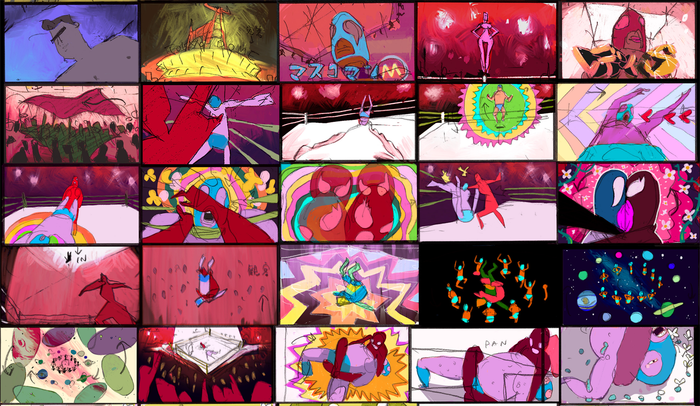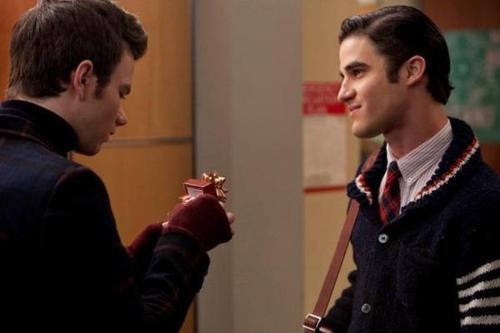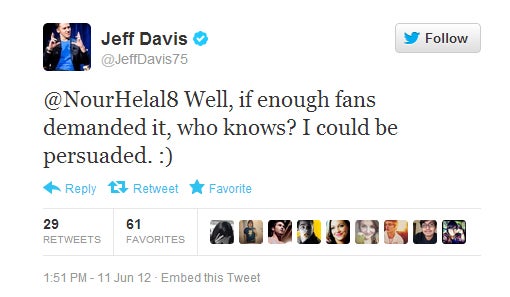Continuing our series on the year in fandom, today the Daily Dot examines the most important events for fandom in 2012.
In considering what kind of lists to make for this series, we asked the following questions: What events, people, and fandoms seemed to create larger discussions about fandom within pop culture? What and who created shifts in how the mainstream viewed and interacted with fandom? What were the far-reaching decisions and moments that will continue to impact fans long after 2012?
Four of our most notable events this year involve fans fundraising. That three of them involved Kickstarter campaigns is interesting to say the least, and it suggests that in the future, even more creators may turn directly to their fanbases to fund projects instead of waiting on a studio or a publisher. Moreover, fans may seize even more control over projects in order to make their voices heard and have the shows they want.
It wouldn’t be the first time fans have taken on such projects, but with the advent of Kickstarter and IndieGoGo, fans may be realizing, more and more, just how easy it is to interact with, and directly support, the creators and creations they love.
Read on to find out what kind of amazing events impacted fandom this year—and what events could linger for years to come.
1) Fifty Shades of Grey hits the jackpot.
We’ve said it 50 ways, but Fifty Shades of Grey blew all comers out of the water. It’s sold over 40 million copies worldwide and more copies in the U.K. than all seven Harry Potter books combined. It singlehandedly kept the publishing industry afloat and opened the floodgates on a barrage of erotica (pejoratively termed “mommy porn,” as if women reading porn is somehow new), hitting a bookshelf near you.
But a side effect of Fifty Shades has been the undeniable mainstreaming of fandom and fanfiction. Fifty Shades’ legacy—beginning as a Twilight fanfic called “Master of the Universe”—meant that wherever mentions of the book or author E.L. James went, mentions of fandom were sure to follow. That also led to a complete reversal in terms of how publishers viewed fanfic writers. No longer an illicit secret where fans, if they published their fic as original novels, filed off the serial numbers and never said a word, in 2012 published fanfic became an actual cottage industry, with even formidable traditional publishers like Penguin scrambling to tap into the popularity of fanfiction—for better and for worse.
2) Gaming and comics fandoms go 13 rounds with misogyny.
What a year. It’s not like sexism wasn’t always a hot-button issue in these two cornerstones of geek culture, but in 2012 we saw a veritable fusillade of jaw-dropping instances where women were overtly attacked, often just for daring to occupy mostly male spaces. Gamers sent death threats to Jennifer Hepler and Anita Sarkeesian for daring to criticize the activity and the genre. Game creators invited us to brutally murder sexually objectified nuns and “protect” a freshly raped Lara Croft. A male member of her own team harassed a female Cross Assault member into resigning mid-game.
Meanwhile, women in both comics and gaming were attacked all year long for being “fake geek girls.” Women attending conventions were harassed, while women buying comic books and games had an equally difficult time. And to top off the year, this month one of the most powerful women in comics, Gail Simone, was inexplicably fired as writer of the popular Batgirl series.
There is an upside to all of this, though: After the lengthy list of 2012, it’s no longer remotely possible for members of gaming and comics cultures to pretend like there isn’t a problem within their respective industries. More and more, women are speaking out, telling stories of being dismissed and silenced throughout both industries. And as the discussion about sexism continues, change is happening at the individual level and the corporate level.
Here’s hoping 2013 will give all the gamers and comics fans a break, regardless of gender.
3) Masaaki Yuasa’s Kick-Heart becomes the first crowdfunded anime.
You might not think the love story of a wrestler and a nun would be anything to get excited about—that is until you combine it with the iconoclastic style of Masaaki Yuasa, the visionary animator who’s had a hand in over a dozen respected productions, including designing fight sequences in Samurai Champloo and directing the award-winning short series Kaiba.
The Japanese Media Arts Festival awarded Yuasa’s brilliant series Tatami Galaxy its Grand Prize in 2010 for “[turning] the limitations of TV on its head.” In 2012, he did it again, by taking the concept for his next project, Kick-Heart, directly to his fans.
“My hope is that investors would pay for what they think is interesting,” Yuasa said in his Kickstarter concept video. “But they don’t. I think crowd-funding… is a great system.”
His gamble paid off: Over 3200 fans chipped in to raise $51,000 more than needed to bring Kick-Heart to life. “Fund this and you’re funding quality animation from visionaries in anime and setting a new precedent in the industry,” fan willrc wrote on Tumblr.
“Congratulations, Kick-Heart,” echoed ian-ime. “This is a big day for anyone who believes in making cool things happen.”

It’s worth noting that Bento Books also successfully funded a Kickstarter campaign this year to produce its manga series, Math Girls.
4) After backlash, Bioware gives Mass Effect 3 fans entirely new ending.
Among gamers, few fans are as loyal and as passionately supportive of their canon as fans of sci-fi shooter game Mass Effect. So when those same fans universally responded to the ending of the critically acclaimed trilogy with outrage, it meant something. (Game spoilers ahead.)
The ending to Mass Effect 3 nullified all the effort players had put into the entire series. From the retakemasseffect Tumblr:
“[Y]ou reach the ending of ME3 and realize that everything you have done means nothing.… No matter what you do the galaxy as you know it is destroyed.… This is a horribly unfulfilling ending to what should have been the masterpiece of the trilogy…. Fans of the Mass Effect trilogy have put far too much time, effort, and money into the game to be abandoned with such a fate.”
Fans of the game united in their attempts to “Retake Mass Effect.” They liked the Facebook page to that effect 63,000 times, sent Bioware passive-aggressive cupcakes, attempted a thwarted charity project, and compiled over an hour of testimonials from distraught players.
Among the fallout from the ending were fans demanding refunds, a Better Business Bureau claim that Bioware engaged in false advertising, and the eventual retirement of its two cofounders. But ultimately, Bioware listened. In June they released a new, expanded ending that offered fans closure, made available to fans for free download.
It didn’t satisfy everyone, and a few months later the fans were getting enraged over My Little Pony fanart. But as far as interactions between fans and producers go, gaining a new ending (as opposed to a complete mid-series do-over) has got to be a first.
5) Homestuck fans raise $2.5 Million for Kickstarter fund.
Homestuck, the massive and massively popular webcomic that’s nearly impenetrable to the uninitiated at this point in its plot, is slowly nearing its conclusion. So what do a million fans do to show their appreciation for a beloved comic that has given them three years of hilarity, confusion, drama, and trolling?
They send creator Andrew Hussie’s Kickstarter project straight to the bank by raising $2.5 million to fund his Homestuck game.
The server costs to keep the Flash-heavy comic alive under the strain of a million daily visitors is so enormous that it’s a miracle Hussie was able to make Homestuck into a viable living at all, but instead his model of incorporating fanart, fan soundtracks, and other fan input into the website has thrived and flourished. Fanartists also contributed to the giveaway incentives for his Kickstarter, which drew so many takers that Hussie had to take a long break in order to autograph 11,000 posters.
The Homestuck Adventure Game is currently the eighth most successful Kickstarter on the site, and perhaps the most successful business venture ever to come from a pre-existing fandom.
6) Inspector Spacetime becomes a reality.
Combine two of the Internet’s favorite things—Doctor Who and Community—and you’re sure to have a hit on your hands; so it was only a matter of time before Travis Richey, the actor who played the title role of Community’s recurring Doctor Who parody Inspector Spacetime, decided to try and make it happen as a fan project.
Alas, NBC quashed the idea of running with the original title, but so far, they’ve allowed Untitled Web Series About a Space Traveler Who Can Also Travel Through Time to go forward. And after a $25,000 funded Kickstarter campaign and a first episode with over 100,000 views—5 percent of Community’s regular viewership—they’ve probably figured out it’d be a terrible marketing ploy for a show that desperately needs all the extra love it can get.
7) Manga publishing companies go DRM-free.
Numerous members of digital technology and publishing communities have argued that Digital Rights Management for books—the restrictions that prevent you from being able to read your Nook purchases on your iPad or your .mobi files on your Kindle, and in some cases from sharing files between your devices—does more harm than good. Typically, arguments run that DRM limits access and fails to protect users from violations. Less frequently discussed are the ways in which DRM also impacts access to manga—Japanese comics—and graphic novels.
In 2012, manga publishers apparently began to change their minds about the efficacy of using DRM to restrict access to their products: Digital Manga, June, and Sublime joined behemoth sci-fi publisher Tor’s imprint Seven Seas, GEN Manga, and a handful of other manga publishers in offering DRM-free downloads. Lee, a reader at MangaBookshelf, sums up what this means for manga fans:
“As a BL reader, I think the biggest/best thing this year has been to see SuBLime, and more recently DMI, come out with DRM-free PDF options… This seems like a groundbreaking development in a climate where readers across all genres are beginning to understand and react against the severely restrictive nature of DRM and platform limitations in e-reading.”
The trend is spreading, primarily among ebook publishers. Tor recently announced that all of its books would be going DRM-free. “It’s clear to us,” said senior editor Patrick Nielsen Hayden, “that this is what our customers want.”
8) The Box Scene Project gets its wish and raises thousands for charity.

Last December, the Glee fandom went nuts when a scene between everyone’s favorite gay power couple, Kurt and Blaine, or Klaine, failed to make the cut in the aired version of an “Extraordinary Merry Christmas.” Two Klaine fans got the idea to ask the Glee fandom to bid on an auction copy of a script containing the deleted scene, and the response was so overwhelming that they not only bought the script but raised over $30,000 for charity in an ongoing awareness campaign called The Box Scene Project.
The project has partnered with other not-for-profits that promote equality, like the Harry Potter Alliance, as well as focused fundraising efforts on a variety of charities like the Commonwealth Shakespeare Company and Project Angel Food.
So what was the scene that caused all the fuss? Glee creator Ryan Murphy finally released it in August. We dare you not to be charmed.
9) MTV puts Sterek on a boat.
When MTV decided to film a promo for the Teen Choice awards, in which its hit Teen Wolf was up for Choice Summer TV Show, it could have played it safe and focused on actor Tyler Posey, who plays the lead. Instead, they went straight for the heart of the show’s fandom: the legions of slash fans who ship Sterek, the completely unintended hypothetical romance of characters Stiles and Derek.
“Shipping” is a play on “relationships” in which fans root for two characters to find love regardless of what the series may actually have in mind. It was all too easy for MTV to play along by filming the two actors, Dylan O’Brien and Tyler Hoechlin, cuddling on a boat.
What makes this marketing ploy different from similar wink-and-nods to homoerotic subtext from Hollywood is that MTV creator Jeff Davis has always been positive towards Sterek fans, and tweeted in June that he was open to the idea of the ship becoming a reality.

Though interactions with fans haven’t always gone smoothly—Davis has since deleted his Tumblr and his Twitter accounts—MTV clearly recognizes what a coup it’s scored in Sterek. After all, the legions of Sterek fans and others who voted in AfterElton’s slash tournament were enough to galvanize that website to start its own regular column devoted to slash pairings. Could it also be enough to give Derek and Stiles their own steamy on-screen romance?
We’ll have to wait and see, but in the meantime, MTV has already broken ground by becoming the first mainstream television show to actively embrace a gay relationship that began as purely a fan construct.
10) Disney buys Star Wars.
We don’t quite know what it means yet, which is why this shocker is last on our list; but we know it’s going to be big. With three more movies on the way, the possibility of tying Star Wars characters into other Disney-owned franchises, à la Kingdom Hearts, and a whole new generation waiting to discover the Star Wars universe, this is one event that will have dividends for years to come.
And in the meantime, there’s plenty of time to enjoy all the crossovers.
Illustration by Masaaki Yuasa/Kickstarter
